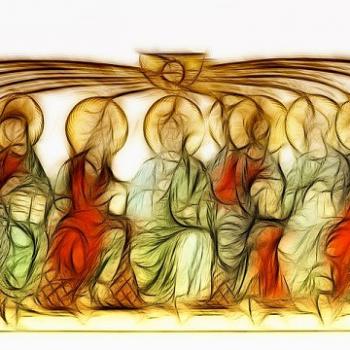I have often said that the mark of a good class is one in which I learn as much as the students do. At the end of the semester, it is a good time to think back over the many unexpected truths I have learned from my students this semester. Since my colleagues and I frequently compare notes on this topic, I have also included in the selection below various items that I learned second-hand from students not in my classes through their professors. Truth is truth, after all—it doesn’t matter where it comes from. In no particular order, here is a sampling.
Some people are important enough to have followers before they are born. Students have told me for years that ancient persons from Socrates to Julius Caesar, literary characters from Achilles to Clytemnestra (“Clytemnestra did not behave as a good Christian wife should”),  and figures from the Hebrew Scriptures from Moses to David managed to be Christians before the birth of Christ, so that’s old hat. But in my latest batch of papers I learned that “Francis believed in living in poverty and taking a lifestyle that the Franciscans before him lived.” I wonder what the Franciscans who lived before Francis called themselves. Proto-Franciscans? Pre-Franciscans? Followers of a Crazy Guy Who Hasn’t Been Born Yet? Really Poor People?
and figures from the Hebrew Scriptures from Moses to David managed to be Christians before the birth of Christ, so that’s old hat. But in my latest batch of papers I learned that “Francis believed in living in poverty and taking a lifestyle that the Franciscans before him lived.” I wonder what the Franciscans who lived before Francis called themselves. Proto-Franciscans? Pre-Franciscans? Followers of a Crazy Guy Who Hasn’t Been Born Yet? Really Poor People?
Going to war against oneself is never a good idea: From a student paper submitted to a colleague:  “[The Battle of Roncevaux Pass] occurred when the Franks intervened in a Muslim conflict between Charles the Great and the great army of Charlemagne,” further explaining that “There is a lot of hate between Charlemagne and King Charles…” Going to war against oneself complicates a number of things. For instance, how are Roland, the hero of this battle at the center of The Song of Roland, and Ganelon, his jealous father-in-law and traitor, supposed to know which side to fight on? Neither? Both? Everyone’s going to need therapy afterwards.
“[The Battle of Roncevaux Pass] occurred when the Franks intervened in a Muslim conflict between Charles the Great and the great army of Charlemagne,” further explaining that “There is a lot of hate between Charlemagne and King Charles…” Going to war against oneself complicates a number of things. For instance, how are Roland, the hero of this battle at the center of The Song of Roland, and Ganelon, his jealous father-in-law and traitor, supposed to know which side to fight on? Neither? Both? Everyone’s going to need therapy afterwards.
People whose names start with the same letter invariably have similar thoughts:  In response to a question about the differences in world views between Dante and Montaigne, a student wrote that
In response to a question about the differences in world views between Dante and Montaigne, a student wrote that  “Dante was extremely passionate that knowledge has to be 100% certain. And if there is knowledge that is certain it has to have no doubts that it could be corrupt.” I’m going to research this new-found information that Descartes was apparently plagiarizing the work of a fellow D-name who lived several hundred years earlier.
“Dante was extremely passionate that knowledge has to be 100% certain. And if there is knowledge that is certain it has to have no doubts that it could be corrupt.” I’m going to research this new-found information that Descartes was apparently plagiarizing the work of a fellow D-name who lived several hundred years earlier.
Martin Luther needed to be clearer about what he really meant:  From one of a colleague’s student papers: “Luther does not say precisely whether or not good works would help one achieve the goal of eternal life, but he does appreciate them.” Then the following from Luther’s “On Christian Liberty,” cited in one of my student papers: “The Christian man is the most free lord of all, and subject to none; a Christian man is the most dutiful serpent of all, and subject to everyone.” There obviously is another research project in finding the heretofore hidden influences of Luther’s Christian serpent on Milton’s Satan in Paradise Lost.
From one of a colleague’s student papers: “Luther does not say precisely whether or not good works would help one achieve the goal of eternal life, but he does appreciate them.” Then the following from Luther’s “On Christian Liberty,” cited in one of my student papers: “The Christian man is the most free lord of all, and subject to none; a Christian man is the most dutiful serpent of all, and subject to everyone.” There obviously is another research project in finding the heretofore hidden influences of Luther’s Christian serpent on Milton’s Satan in Paradise Lost.
Why use just a few words when a whole bunch of them will suffice? Assigned papers are an opportunity for students to flex their word-using muscles in print. Often a student who has never once opened her mouth in seminar will make sure that her quota of allowed words unused in seminar makes it into a paper. For instance, why write that
Works of literature often focus on the customs of people living in the author’s culture,
when you could write instead that
Throughout history, scholars have been displaying the impacts society has on people’s lives through various forms of expression. Of some of the more famous styles, writings and literature from oral teachings along with reflections on certain times provides future generations with important first-hand accounts of how lifestyles and culture influenced the people.
And why describe Dante’s organization of Hell in this manner:
Dante’s descriptions of the punishments in Hell, as well as the individuals one finds there, tell us much about the attitudes of his time.
when the following description will suffice?
During Dante’s pilgrimage through Hell, the descriptions as well as reasons for placement of particular individuals speaks through society’s influence, deeming Dante’s opinion in accordance with many of his time. Without Dante’s harsh portrayal of specific individuals, the backlash on society would be unknown.
You can only commit suicide once: When a student missed a seminar on Dante’s Inferno in the middle of the semester due to illness, I assigned her a makeup 1000-1200 word reflection on  Canto XIII, in which one finds the suicides—the “violent against themselves.” The seminar discussion focused on this section of Dante’s poem was fascinating, with my largely Catholic students flip-flopping back and forth between the position that they know they are supposed to hold as good Catholics—no suicide is ever justified—and a more nuanced judgment that permits consideration of individual circumstances.
Canto XIII, in which one finds the suicides—the “violent against themselves.” The seminar discussion focused on this section of Dante’s poem was fascinating, with my largely Catholic students flip-flopping back and forth between the position that they know they are supposed to hold as good Catholics—no suicide is ever justified—and a more nuanced judgment that permits consideration of individual circumstances.
In her makeup assignment, my student opened her reflection with noting that as
An extremely controversial topic, suicide has been a self-inflicting action from the beginning of time.
followed shortly after by the observation that
Suicide is an avoidable form of death.
As one of my colleagues wrote on Facebook when I put these two gems up for display on my wall, “Holy tautology, Batman!” Other friends and colleagues said that this immediately reminded them of the “Suicide is Painless” theme song from “M.A.S.H.”: “Suicide is painless, it brings on many changes, and I can take or leave it if I please . . .”
But others saw something I did not immediately recognize—possible profundity. “That’s deep,” a colleague from the chemistry department commented;  “The first comment strikes me as a particularly profound metaphysical point about the (a)temporal status of analytic truths,” a former philosophy major now in graduate school contributed. Then this from a Facebook acquaintance that I have never met in person, but with whom I share the privilege of having earned a Bachelor’s degree in the Great Books program at St. John’s College:
“The first comment strikes me as a particularly profound metaphysical point about the (a)temporal status of analytic truths,” a former philosophy major now in graduate school contributed. Then this from a Facebook acquaintance that I have never met in person, but with whom I share the privilege of having earned a Bachelor’s degree in the Great Books program at St. John’s College:
I think the second [student comment] is, indeed, quite discussable. Is death ever avoidable? Is suicide not now recognized as a possible outcome of untreated depression? Can a severely depressed person always be expected to take the steps required for his or her own treatment?
Is suicide always an avoidable form of death, in other words? From the mind of a stressed and possibly confused freshman emerges an apparent “Well, duh!” sort of statement that, as it turns out, might have surprising depth and complexity. I feel an essay coming on!













